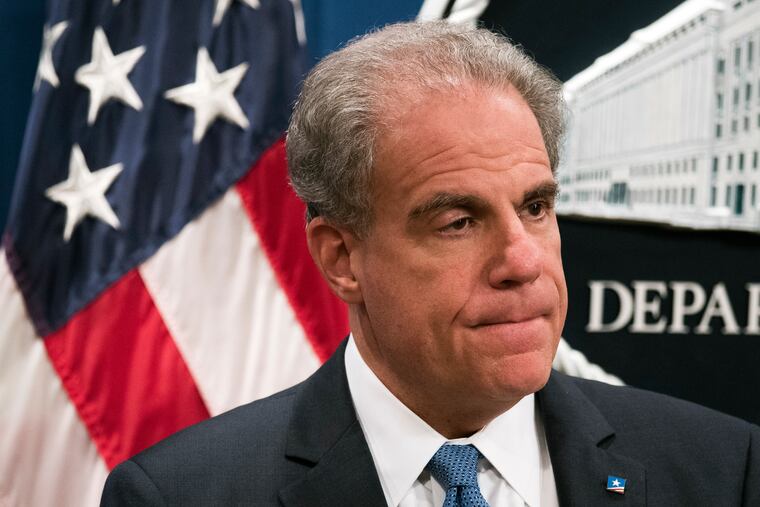Justice Department watchdog tells Russia report witnesses they can’t give written feedback — then reverses course
The inspector general is aiming to complete the witness reviews by Nov. 21, although release of the report may wait until after the Thanksgiving holiday, the people familiar with the matter said.

WASHINGTON — The Justice Department inspector general’s office told witnesses set to review draft sections of its long-awaited report on the FBI investigation of President Donald Trump’s 2016 campaign that they would not be allowed to submit written feedback, but later asserted that was not their intention after a Washington Post report disclosing the unusual restriction.
The Post’s report, first published early Thursday evening, detailed parameters that some feared could make the final document less accurate. At the time, the Justice Department inspector general’s office declined to comment. But late Thursday night, Stephanie Logan, a spokeswoman, said the office would clarify to witnesses that they could submit written feedback “consistent with rules to protect classified information.”
"As part of our factual accuracy review, and consistent with our usual practice, we are providing witnesses with the opportunity to review portions of the report that relate to them," Logan said. "Also consistent with our practice, we undertake every effort to ensure witnesses can provide their comments and we are clarifying to witnesses that they will be able to provide written comments, consistent with rules to protect classified information."
The Post had reported hours earlier that — as is the case in most inspector general probes — witnesses were being invited to review draft sections of the report and offer comments and corrections. But — unlike most cases — they were told those comments must be conveyed only verbally, people familiar with the matter said. They spoke on the condition of anonymity because of the political and legal sensitivity of the matter.
It remains unclear why witnesses were given that instruction initially.
Even though Attorney General William Barr and other officials have been working in recent weeks to determine what should be redacted from the report as classified or private information, people familiar with the process said that the entire draft document is marked "Top Secret," so anyone who discusses its contents outside a secure government room could be committing a crime.
Witnesses, the people said, were being asked to review their sections in a secure area, after signing nondisclosure agreements, according to people familiar with the matter. The witnesses have also been told they will not be allowed to remove any notes they make about the document, the people said.
The initial directives left some witnesses concerned that their objections might not be recorded precisely and incorporated into the inspector general’s findings, the people said. The witnesses, they said, were also concerned that the process gave the inspector general complete control in characterizing any comments witnesses make — and left witnesses with limited ability to create a paper trail that might help them show their words were captured inaccurately.
The inspector general is aiming to complete the witness reviews by Nov. 21, although release of the report may wait until after the Thanksgiving holiday, the people familiar with the matter said.
Democrats and Republicans alike have eagerly awaited release of Inspector General Michael Horowitz's report, hopeful that the Justice Department's internal watchdog will validate their views on the law enforcement investigation that dogged the first two years of Trump's presidency.
Conservatives have alleged that a medley of wrongdoing occurred during the investigation, which would eventually be taken over by special counsel Robert Mueller III, and they are likely to seize on any criticism that Horowitz directs at those involved in the probe. Some Trump supporters have referred to the investigation as an attempted “coup.”
Democrats, meanwhile, are hopeful Horowitz will disprove various conspiracy theories that have been offered about the case and refute Trump's assertion that Mueller's probe was a "witch hunt" tainted by political bias against the president.
The report’s release is also likely to be a major credibility test for Barr, who has suggested impropriety by past leadership at the FBI. With Horowitz’s review ongoing, Barr earlier this year tapped a federal prosecutor in Connecticut — U.S. Attorney John Durham — to separately explore whether the intelligence activities aimed at people tied to the Trump campaign were lawful. Durham’s investigation is exploring potential crimes, officials have said.
Barr said this week that public release of the inspector general report is “imminent,” though he provided no specific date. People familiar with the matter said witnesses are scheduled this week and next to review drafts and offer feedback — generally the last step the inspector general takes before making the document public.
It is unclear what Horowitz has concluded. Witnesses have been asked about an array of topics, though investigators seem keenly focused on the FBI and Justice Department’s applications to the Foreign Intelligence Surveillance Court to monitor the communications of a former Trump campaign adviser, Carter Page, people familiar with the matter said.